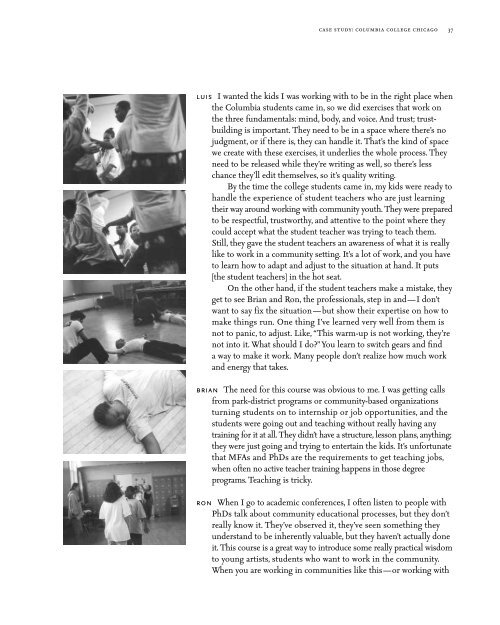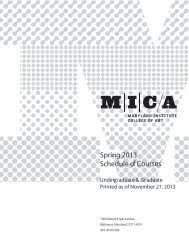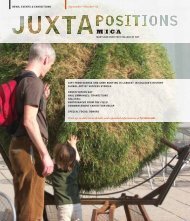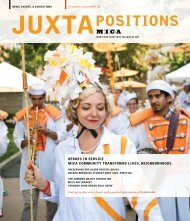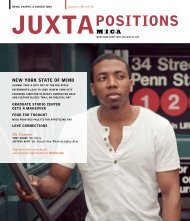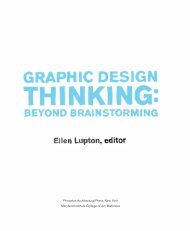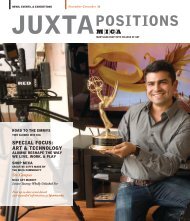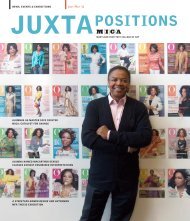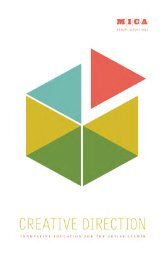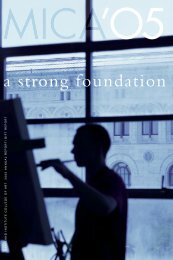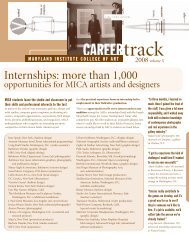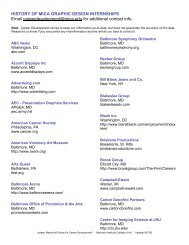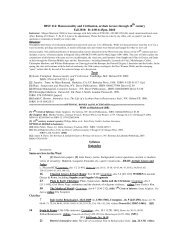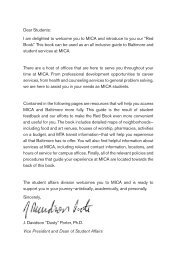art/vision/voice - Maryland Institute College of Art
art/vision/voice - Maryland Institute College of Art
art/vision/voice - Maryland Institute College of Art
Create successful ePaper yourself
Turn your PDF publications into a flip-book with our unique Google optimized e-Paper software.
case study: columbia college chicago 37<br />
luis I wanted the kids I was working with to be in the right place when<br />
the Columbia students came in, so we did exercises that work on<br />
the three fundamentals: mind, body, and <strong>voice</strong>. And trust; trustbuilding<br />
is important. They need to be in a space where there’s no<br />
judgment, or if there is, they can handle it. That’s the kind <strong>of</strong> space<br />
we create with these exercises, it underlies the whole process. They<br />
need to be released while they’re writing as well, so there’s less<br />
chance they’ll edit themselves, so it’s quality writing.<br />
By the time the college students came in, my kids were ready to<br />
handle the experience <strong>of</strong> student teachers who are just learning<br />
their way around working with community youth. They were prepared<br />
to be respectful, trustworthy, and attentive to the point where they<br />
could accept what the student teacher was trying to teach them.<br />
Still, they gave the student teachers an awareness <strong>of</strong> what it is really<br />
like to work in a community setting. It’s a lot <strong>of</strong> work, and you have<br />
to learn how to adapt and adjust to the situation at hand. It puts<br />
[the student teachers] in the hot seat.<br />
On the other hand, if the student teachers make a mistake, they<br />
get to see Brian and Ron, the pr<strong>of</strong>essionals, step in and—I don’t<br />
want to say fix the situation — but show their expertise on how to<br />
make things run. One thing I’ve learned very well from them is<br />
not to panic, to adjust. Like, “This warm-up is not working, they’re<br />
not into it. What should I do?” You learn to switch gears and find<br />
a way to make it work. Many people don’t realize how much work<br />
and energy that takes.<br />
brian The need for this course was obvious to me. I was getting calls<br />
from park-district programs or community-based organizations<br />
turning students on to internship or job opportunities, and the<br />
students were going out and teaching without really having any<br />
training for it at all. They didn’t have a structure, lesson plans, anything;<br />
they were just going and trying to entertain the kids. It’s unfortunate<br />
that MFAs and PhDs are the requirements to get teaching jobs,<br />
when <strong>of</strong>ten no active teacher training happens in those degree<br />
programs. Teaching is tricky.<br />
ron When I go to academic conferences, I <strong>of</strong>ten listen to people with<br />
PhDs talk about community educational processes, but they don’t<br />
really know it. They’ve observed it, they’ve seen something they<br />
understand to be inherently valuable, but they haven’t actually done<br />
it. This course is a great way to introduce some really practical wisdom<br />
to young <strong>art</strong>ists, students who want to work in the community.<br />
When you are working in communities like this—or working with


